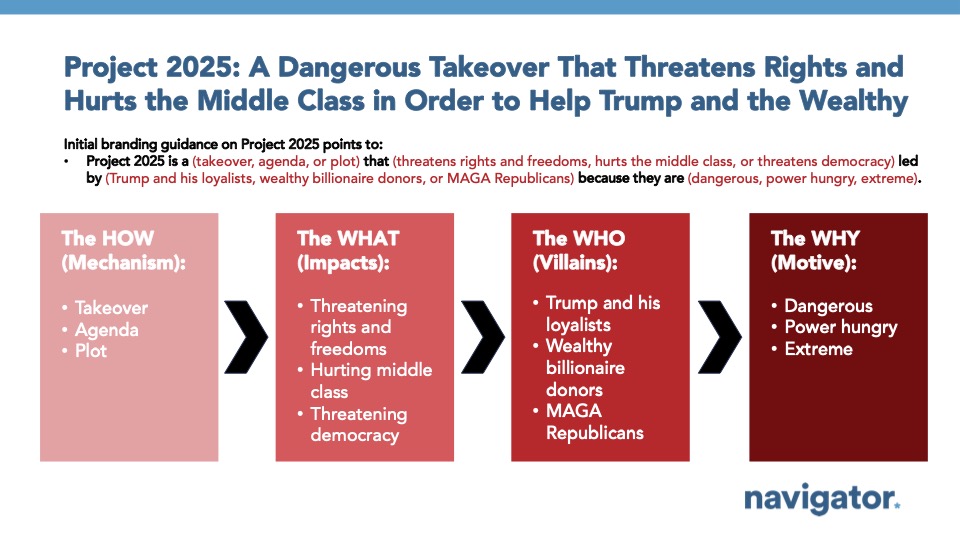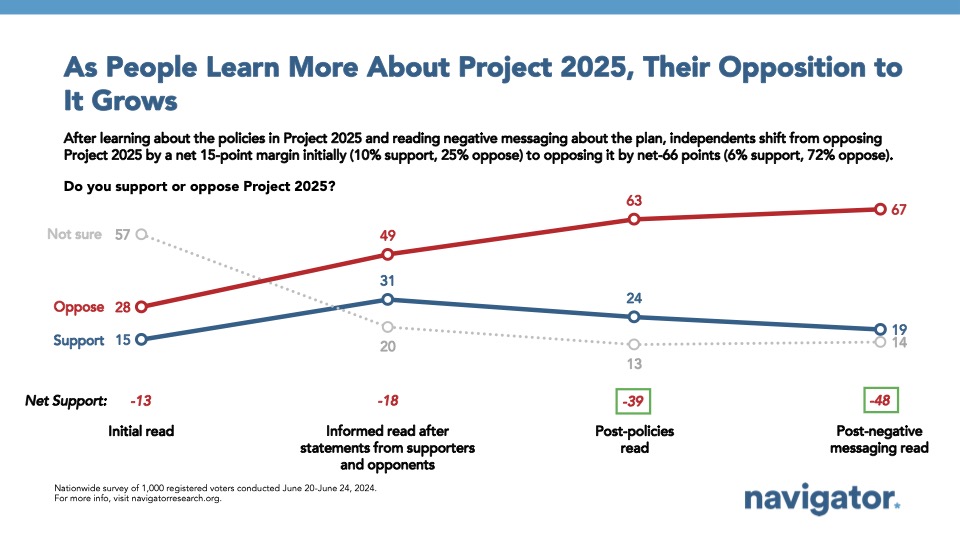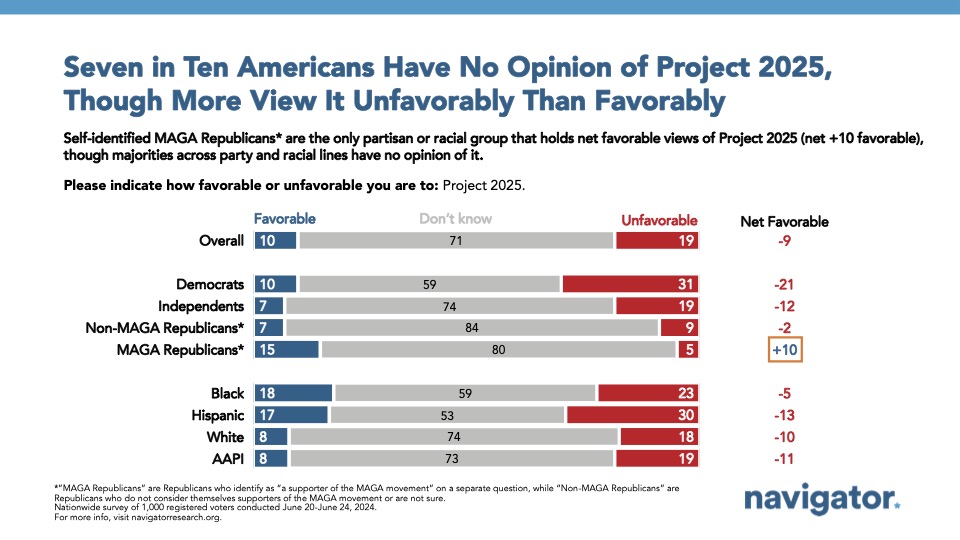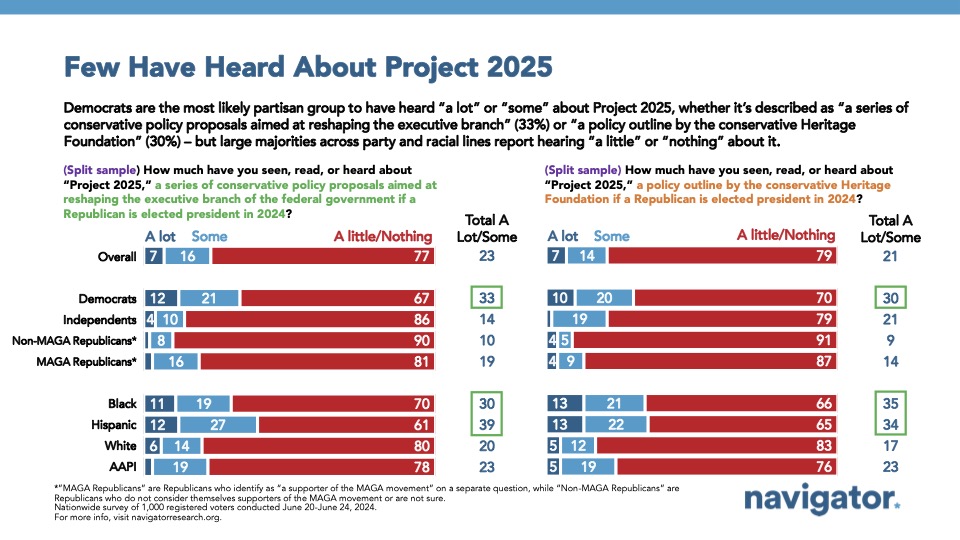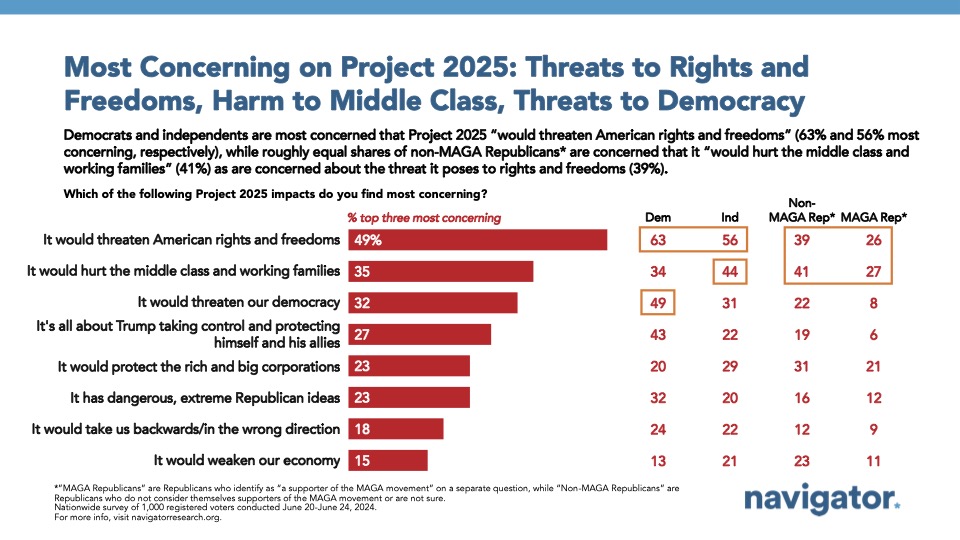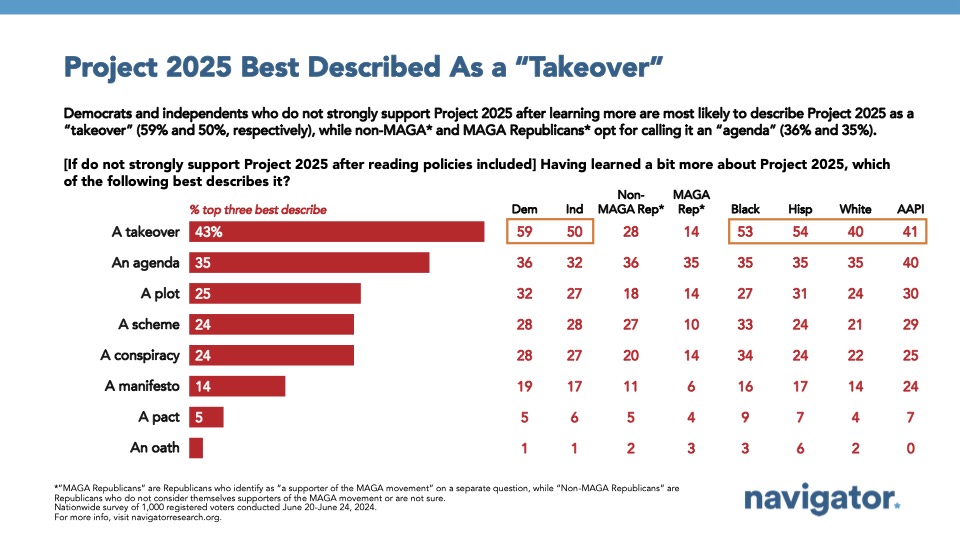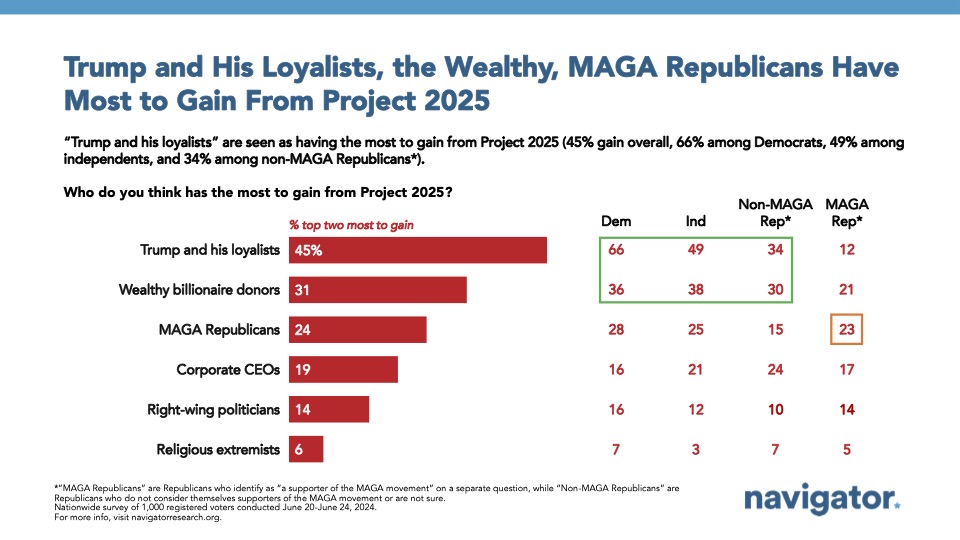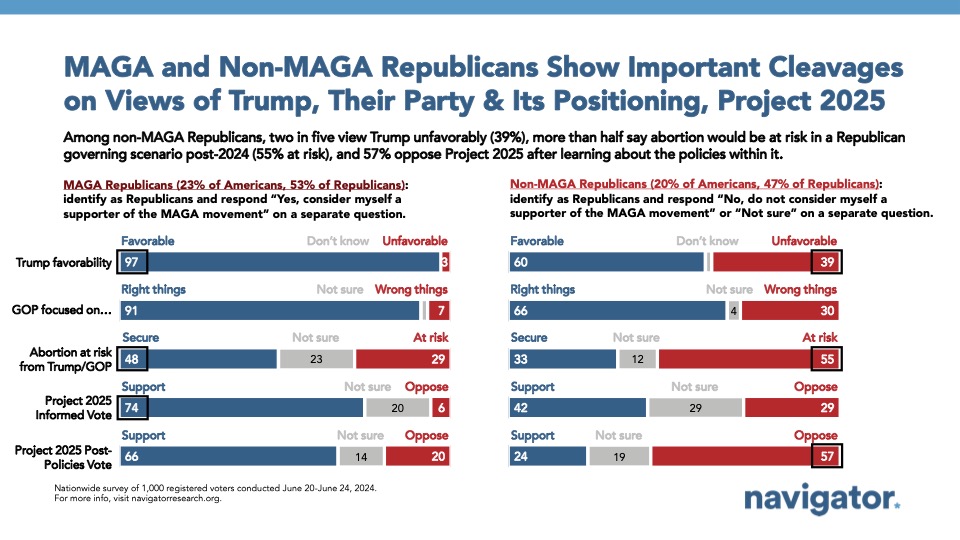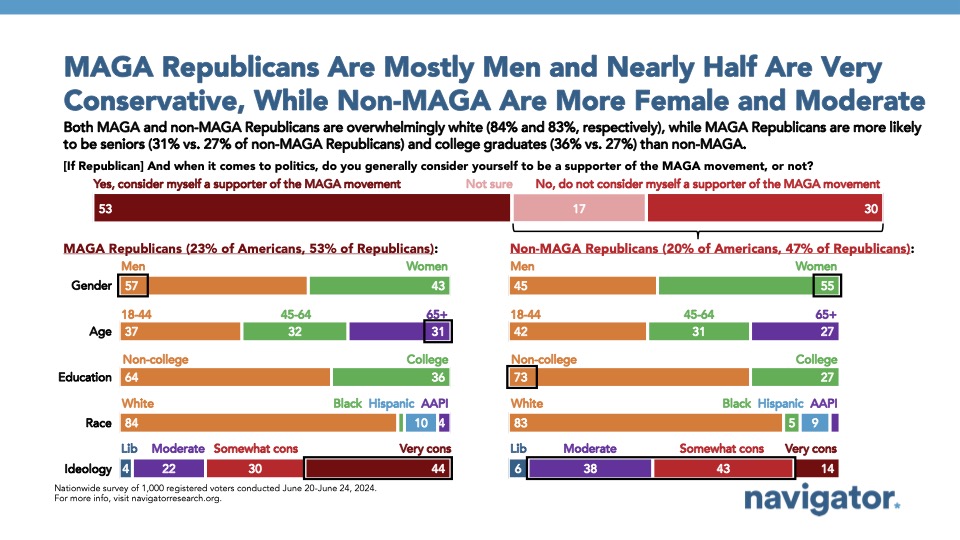Branding Guide: Project 2025
This special Navigator Research report is the first of three releases on how Americans view “Project 2025,” the conservative blueprint for a second Donald Trump presidency. This first release is a branding and messaging guide for advocates, including the top concerns Americans have about the impacts of Project 2025, the most resonant language to describe Project 2025, and who is seen as benefiting the most from Project 2025 being implemented.
Seven in ten Americans are unfamiliar with Project 2025.
Seven in ten Americans have not heard enough to have an opinion about Project 2025, but after hearing about it, two in three Americans become opposed. 71 percent initially don’t know enough to have an opinion of Project 2025 (net -9; 10 percent favorable – 19 percent unfavorable). Additionally, nearly four in five Americans report not having heard anything about Project 2025 either when described as “a series of conservative policy proposals aimed at reshaping the executive branch of the federal government if a Republican is elected president in 2024” (77 percent). Black Americans, Hispanic Americans, and Democrats are most likely to have heard “a lot” or “some” about Project 2025, though fewer than two in five have heard about it (30 percent, 39 percent, and 33 percent, respectively).
- Support for Project 2025 is measured at three additional points in this survey. The first is after people hear a generally supportive description of the plan that it “represents the next conservative Republican president’s last chance to save the republic, rescuing the country from the grip of the radical left through the right governing agenda and the right leadership” and a generally opposed description of the plan that “Project 2025 is an extreme Republican plan that will give the president new and unchecked powers over federal agencies, eliminate abortion access, and roll back action on climate change, LGBTQ+ rights, and other areas.” After respondents are shown both of these statements, support shifts from net -13 to net -18 (31 percent support – 49 percent oppose), with independents shifting from net -15 initially to net -24 (21 percent support – 45 percent oppose).
- People are again asked their opinion of the plan after learning 19 of the policy proposals. Overall, support shifts from net -18 to net -39 (24 percent support – 63 percent oppose). The groups most likely to shift against supporting Project 2025 include Republicans by a net 42 points from net +51 to net +9 (46 percent support – 37 percent oppose), independents by a net 35 points from net -24 to net -59 (10 percent support – 69 percent oppose), and Black Americans by a net 16 points from net -38 to net -54 (16 percent support – 70 percent oppose).
- The final measurement of support is after being asked about which framings of Project 2025 are seen as most concerning and a variety of different language tests about how to describe the plan (which will be the subject of our third report). Project 2025 is underwater by 48 points at the end of this survey (19 percent support – 67 percent oppose), with nearly three in four independents opposed to it (net -66; 6 percent support – 72 percent oppose) and Republicans split on the plan (net -2; 38 percent support – 40 percent oppose); more than nine in ten Democrats are opposed to Project 2025 by the end of the survey (net -88; 4 percent support – 92 percent oppose).
The biggest concerns about Project 2025 are threats to rights and freedoms, to the middle class and working families, and to our democracy.
The top concerns Americans have about Project 2025 after learning about its policies and reading messaging against it are that “it would threaten American rights and freedoms” (49 percent), that “it would hurt the middle class and working families” (35 percent), and that “it would threaten our democracy” (32 percent). Two in three Democrats (63 percent) and a majority of independents (56 percent) are most likely to be concerned about Project 2025 threatening rights and freedoms; the second most likely concern among Democrats is that “it would threaten our democracy” (49 percent) while the second most likely concern among independents is that “it would hurt the middle class and working families” (44 percent).
Project 2025 can best be described as a dangerous takeover that would most benefit Trump, his loyalists, and wealthy billionaire donors.
When describing Project 2025, the most powerful description is that it’s a “takeover” by Trump and his loyalists who are “power hungry” and “dangerous.” When asked among a list of terms what best describes Project 2025, the descriptor most associated with it is “a takeover” (43 percent), including nearly three in five Democrats (59 percent) and half of independents (50 percent) who say that best describes Project 2025. “A takeover” is also seen as the best descriptor across racial demographics, including majorities of Hispanic Americans (54 percent) and Black Americans (53 percent), as well as pluralities of Asian Americans and Pacific Islanders (41 percent) and white Americans (40 percent).
- “Trump and his loyalists” are seen as having the most to gain from Project 2025 (45 percent), while three in ten Americans say that “wealthy billionaire donors” have the most to gain from Project 2025 (31 percent). Two in three Democrats (66 percent) and about half of independents (49 percent) say “Trump and his loyalists” have the most to gain.
- The words and phrases most associated with those who support Project 2025 include “dangerous” (44 percent), “power hungry” (34 percent), and “extreme” (32 percent).
Bonus finding: When Republicans learn more about Project 2025, they become greatly divided on support for it, with significant differences between Republicans who associate with the MAGA movement and those who do not.
53 percent of Republicans in this survey say they consider themselves supporters of the MAGA movement while 47 percent say they either do not consider themselves supporters of the MAGA movement (30 percent) or aren’t sure (17 percent). This grouping of Republicans has some existing differentiation, where MAGA Republicans are universally favorable toward Donald Trump (net +94; 97 percent favorable – 3 percent unfavorable) while non-MAGA Republicans are more divided (net +21; 60 percent favorable – 39 percent unfavorable). This extends toward their impression of Project 2025: though both MAGA Republicans and non-MAGA Republicans are initially net supportive of Project 2025, two in three MAGA Republicans support Project 2025 after messaging (net +46; 66 percent favorable – 20 percent unfavorable) while nearly three in five non-MAGA Republicans become opposed to it (net -33; 24 percent favorable – 57 percent unfavorable).
- Non-MAGA Republicans are more likely to be women (55 percent) without college degrees (73 percent) of whom only 14 percent identify as being ideologically “very conservative.” By contrast, MAGA Republicans are more likely to be men (57 percent) with college degrees (36 percent), of whom nearly half identify as being ideologically “very conservative” (44 percent).

